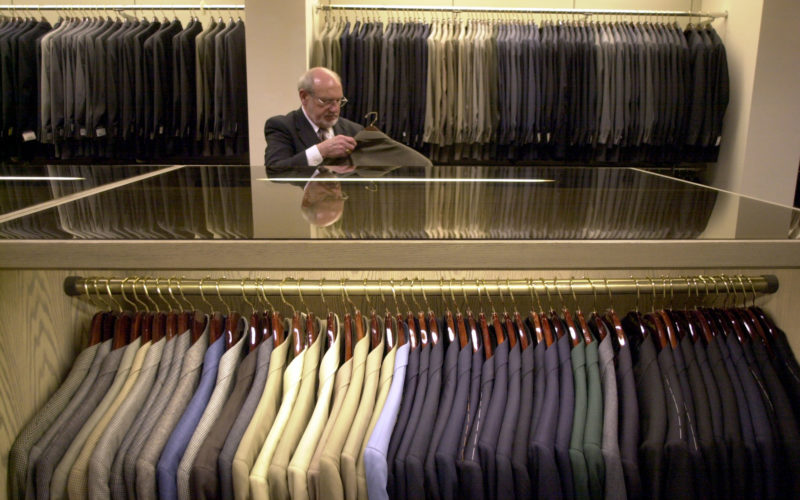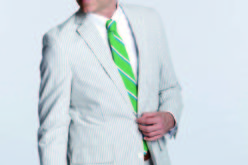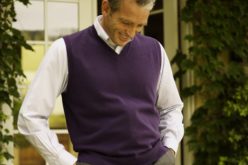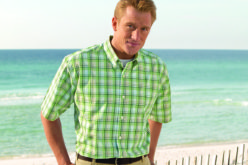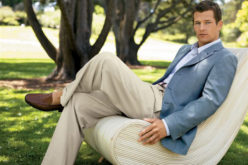Q. I have a column of yours about summer suits when you said matched suits are the dressiest and that blazers are next. I thought blazers had their origin with sporting events. My college gave them for intramural athletic excellence, and they were worn with yachting caps, etc. How did a jacket that is so informal become so dressy? I am old-fashioned in this respect and need enlightenment.
A. Even though men’s clothing remains pretty much the same over the years, occasionally some things do change. It is true there was a time when blazers were strictly for yachting, but that time has long past. Suits and blazers are worn by normal men who do not own such luxuries. Keep in mind that throughout history men wore styles that were a great deal more elegant and flamboyant than they are today.
Yes, it’s true that these days matched suits are the dressiest of a man’s daytime, non-formal attire, Next comes blazers, with the double-breasted version being a bit more formal than the single-breasted. And after blazers, a similarly-cut jacket with a more rugged outdoorsy look, known as a sport coat or sports jacket, is the least dressy of these non-casual looks.
For those unclear of the distinctions: a suit is a combination of a jacket and trousers made of matching fabric, but blazers and sports jackets are worn with unmatched, contrasting trousers, referred to in the clothing industry as “odd trousers.” And they range from high-end, well-cut wool dress trousers, to informal cotton khakis, and very casual jeans. But, if you are wondering how a blazer is specifically different from a sport coat, the answers are subtle.
Both are cut pretty much the same, so the overall silhouette is not the key. The major difference between a blazer and a sports jacket is the fabric. Typically, blazers come in a solid color. The most popular choice is navy blue in a medium-weight wool; however, today, you can find blazers in different colors that fit your personal style and preference. Blazers are usually made of a dressy, smooth fabric, while sports jackets are more often made of textured, more rugged and casual fabrics. The patterns may be a subtle herringbone tweed, a small check, or a large windowpane design. The result is that blazers are more formal and dressy than sport coats.
Unlike what most people think, the difference between the two types of jackets is not the buttons. Blazers do often feature shiny metal buttons made of silver, gold, or brass (never on sport coats); even so, this is not an iron-clad rule. Many blazers have more formal, matching dark horn suit-buttons. Sport coats sometimes have the most casual buttons of all . . . leather.
Another big difference is the type of pockets on each. Sleek inset pockets (with or without flaps) might be found on both (as well as on suits), but the casual patch pockets are more likely to be on an informal sports jacket than on a blazer.
For many occasions where a suit is the expected attire, a man might choose to substitute a blazer and he would be properly attired. But this is not the case with sports jackets. If, let’s say, you are invited to a dressy event where most of the men will be wearing a suit, you might choose instead to wear a well-cut navy blazer with nice dress trousers, a handsome shirt, tie, and pocket square. You would probably feel comfortable and well-put-together. But, for the same sort of occasion, if you wore a tweed or patterned sport coat, you might very well feel under-dressed. A special occasion requires special attire. Wear your suit or a blazer.
Blazers are great for a casual wedding or a nice dinner out. And they are perfect for business-casual days at the office. The navy blazer is an essential “go-to” in a well-dressed man’s wardrobe; it is often the answer when you are wondering what to wear. Sport coats are the most casual of the various jackets, they can be dressed up with a shirt and tie or dressed down with a pair of khakis and clean sneakers.
Every man’s closet needs, at the very least, one of each of these in his wardrobe.
Please send your men’s dress and grooming questions to MALE CALL: Lois.Fenton@prodigy.net

